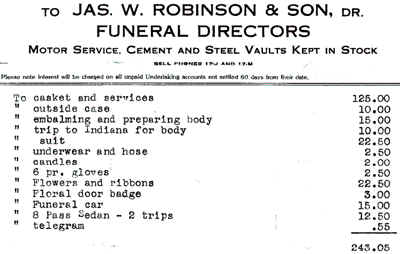Trübe Gedanken
Im März 2001 Hi Mike und Penny, ich hab gerade mit Emina gechattet. Für sie ist es ein großes Rätsel, dass über Paul nichts zu erfahren ist. Danke für deine Hilfe bei der Suche, Emina! (Foto oben: Emina in Chicago) Ich meine, die Zeitungen hätten nur dann über Paul geschrieben, wenn Freunde, Kollegen, Verwandte eine Anzeige aufgegeben hätten. - Irgendwer muss ihn begraben haben, vielleicht auf einem der heute eingeebneten Friedhöfe??? Irgendwo in Pennsylvania muss doch sein Name stehen, im Sterberegister einer Pfarrei oder so, im Verzeichnis der Ingenieure, Angestellten, Gehaltsempfänger. In welcher Stadt? Owensdale? Connellsville? Uniontown? Oder sonstwo? - Wo ist bloß der tolle Felsen, auf dem er mit einem Freund sitzt? Ist er wirklich in PA? Alles Liebe und gute Wünsche für dich und deine Familie, Marlies und Wilhelm
Gib nicht auf, wir haben gerade erst angefangen zu kämpfen. Mike
Wo ist dieser abenteuerliche Felsen?
(aus Hermann Hesse: Landstreicherherberge)
Casparis Rocks in Fayette County, PA
Marlies/Wilhelm, Casparis Rocks (Fotos aus Fay-West.On-Line) könnten die Felsen auf dem Postkarten-Foto von Paul sein.... oder sogar auch Baughman's Point auf einer anderen Karte der Sammlung ... ich will eine Kopie der Postkarte von Paul in unserem Geschichtsverein herumzeigen. Vielleicht kann dort jemand sagen, was darauf zu sehen ist ...danke!! Mike
Paul war ein ausgebildeter Bauingenieur und/oder House Carpenter, das ist ein Techniker, der an der Planung oder am Bau von Gebäuden arbeitet, oft im Auftrag der Gemeinde oder der Stadt. Er lebte in den USA in Owensdale, einer kleinen Stadt im SW Pennsylvanias, nördlich von Connellsville, Fayette County.
Connellsville Fayette Co., SW Pa., am Youghiogheny River in den Allegheny Mts.; besiedelt seit 1770, Stadtbezirk seit 1806, zur Stadt erklärt 1911. Wichtiger Koks- und Kohleerzeuger. Uniontown ist der
Regierungssitz
von Fayette
County, Pennsylvania,
. In Zeiten des Kohle-Booms Anfang der 1900er Jahre hatten
wenigstens 13 Millionäre ihren Wohnsitz in Uniontown
, das sind anteilmäßig mehr als in jeder anderen Stadt der USA.
Wolfgang
"in Search of Paul",
"You can imagine
people chatting over the fences of their company houses.
You can picture steam trains chugging up the tracks and imagine the smell of bread baking, and smoke pouring out of the coke ovens. Now, everything’s
so quiet. I like the mood of these places. It’s a little sad, yet still
beautiful. I guess I like them for the same reason people like pictures of weathered barns. Text:
Chris
DellaMea www.coalcampusa.com The Company Houses - Zechenhäuser Die Frick Company Houses wurden alle nach einem einheitlichen Plan aus Holz gebaut, so schnell und so wirtschaftlich wie möglich: Doppelhäuser, je zwei oder drei Schlafkammern oben, drei Zimmer im Erdgeschoss, ein kühler Keller um Vorräte aufzubewahren wie Kartoffeln, Rüben, Fleisch, Obst, Gemüse, Eingemachtes. Sie waren zwar nicht allzu komfortabel - kein fließendes Wasser, Pumpe und Toilette hinterm Haus - aber die Häuser waren solide gebaut, sind heute mehr als 100 Jahre alt und immer noch in der Landschaft zu finden, wo man sie am wenigsten erwartet. Hinterm Haus waren auch meist ein Schuppen und ein kleiner Garten und Weide für eine Kuh, Kleinvieh, ein Schwein und Hühner, eingezäunt gegen streunende Tiere. -
"A wire fence (Drahtzaun) extended the length of the front of the property and along the sides. A board fence (Bretterzaun) enclosed the rear. There were no sidewalks or paved roads. The "street" in front of our house had deep ruts and couldn't be traveled by a vehicle. (Hey! Jetzt wissen wir, warum auf alten PA-Fotos die Männer häufig aufgekrempelte Hosenbeine haben!) Each home had a backyard large enough to grow a variety of vegetables. Everyone planted tomatoes, potatoes, beans and other vegetables. Most everyone home canned many of the items. By the time December came round, the shelves in our cellar were filled with all sorts of pickles, tomatoes, beans, chili sauce and a variety of jams and jellies. Beyond the back fence, was a row of coops where people raised chickens, ducks, geese or turkeys. One of my chores was to see that the stock was fed and watered." by Bob Howells, http://www.rootsweb.com/~paluzern "Really no one locked their doors, we
couldn’t lock our door because we had the old type key. I think everyone
in town had one like it. They called it a skeleton key."
Foto oben: ein Kumpel "My father used to work so hard. He used to get up early and my mother used to make his bucket (Henkelmann - Topf mit Essen) and when he used to come home we had the water ready for him to wash himself. ...
Well
for dinner we all sat around the table, we didn’t talk too much, we ate
and then we’d wash the dishes not with soap but with warm water and then
the water that we used was put it in a slop bucket and a neighbor used to
have pigs. They used to come for it and give it to the pigs. Mrs. F., born 1915,
"The kitchen range (Küchenherd) was a real "work horse." It was the domain of the woman of the house. All the cooking and baking was done in or on it, and it heated the water for our use. (...) There was always a kettle on the stove containing heated water just in case a friend or neighbor dropped in for a cup of tea. When that happened, Mom would put some loose tea in the teapot, put some boiling water over it and when the tea was ready, poured the tea through a tea strainer into a cup.
We used to eat a lot
of vegetables, string beans with potatoes; the meat wasn’t too expensive
then. My mother used to make delicious soup out of soup bones or she’d make stew
or chickens from a farm. We had tomatoes, potatoes, and then there was a
fish man used to come around on Fridays. In the winter time my father used
to go for winter apples they were called and winter pears people used to
give to him. We were poor but we had enough to eat. My mother used to make
bread. And there was a woman who used to bring and sell us homemade butter
and fresh eggs from the farm every week with her little one-horse buggy.
Foto www.dep.state.pa.us: Die Kohlen für den Herd gab es für die Familien der Bergleute gratis. Sie mussten aber selbst abgeholt werden.
Allein lebende Arbeiter und Singles fanden häufig ein Unterkommen bei Familien aus ihrem Heimatland ... wenn genügend Platz da war. Ihre Miete bedeutete eine willkommene Aufbesserung des Familien-Einkommens. Zusätzlich bauten die Gesellschaften auch noch Wohnheime, wo alleinstehende Arbeiter gegen Mietzahlung hausen konnten, mit mehreren zusammen unter einem Dach, aber jeder hatte sein eigenes Zimmer. Diese Singles in Wohnheimen lebten unter der strengen Aufsicht eines Hausvaters (boarding house boss). Grundsätzlich stellte man lieber Verheiratete ein, weil diese seltener ihren Arbeitsplatz wechselten. - Als kein Bedarf mehr für die Boardinghouses bestand, wurden sie auch an Familien vermietet.
... Wo mag Paul gewohnt haben?
Ursprünglich teilten sich jeweils zwei Familien die Doppel-Toilette hinterm Haus (Outhouse - Plumpsklo). Regelmäßig erschienen bei ihnen Arbeiter, sie hießen bei allen die "Honig-Taucher - honey dippers". Ein sehr anschauliches Wort um ihre Tätigkeit zu beschreiben, nämlich die Plumps-Klos zu leeren, wenn sie voll waren und überzulaufen drohten. Honey dippers, in Westfalen Jaucheschepper, hießen aber auch die Eimerchen, die am Ende eines langen Holzstiels befestigt waren (der zu allem Unglück manchmal abbrach!) und mit denen die Männer die dickflüssige dunkelbraune Jauche aus den mit Backstein ausgemauerten Outhouse-Gruben schöpften. (... Auf dem Lande, wo hinter der Scheune noch viel Platz war, ging die Sache unkomplizierter: es wurden einfach neue Gruben gegraben und das Outhouse auf die neue Stelle gezogen.) Die Jauche war wie schon erwähnt nicht etwa HONIGFARBEN sondern braun! Um noch weiter über dieses Thema zu sinnieren: in diesem Zusammenhang ist das Wort honey - Honig natürlich eine derbe Ironie: ein lieblich-süßer Name für ein stinkendes ekelhaftes Zeugs.
Manche Einwohner verschönerten sogar die Freiluft-Klos und tapezierten ihre Wände, oder sie pflanzten Blumen daneben, die robuste Rudbeckia (rechts), allgemein als Outhouse Plants = Plumpsklo Blumen bekannt. Andere kauften extra Klopapier statt der Zeitungsblätter (mit deren Hilfe etliche Kinder schon vor dem Schuleintritt Lesen gelernt haben sollen), wenn Besuch von auswärts kam.
Die heute noch bestehenden Company Houses sind ansehnlich renoviert, mit hell verkleideter Fassade (Foto links), so auch in Owensdale (siehe Foto oben "Wolfgang in Search of Paul"!). Einige alte Häuser wurden später für $100 pro Stück zum Kauf angeboten. Bedingung: der Käufer musste sie abbauen und wegtransportieren. Manche nahmen das Angebot an und verwendeten die Materialien als Bauholz etc., um ein neues Häuschen ganz in der Nähe zu bauen..
"A coal patch -
Zechenkolonie (called
"coal camp" elsewhere) is a town where everything was built and owned by a
coal company, including schools, churches, stores, theatres, and residential
structures. Coal patches in Western Pennsylvania generally date
from the 1870s through the 1920s. Although the coal seams (Flöze)
around the patches are mined out and the coke ovens are crumbling ruins, people still
live in these towns in homes built by the coal companies a century or more
ago."
So war es wirklich in den Bergarbeiter-Städten. Nicht nur dass die Zeche die Coal Miners mit Jobs versorgte und ihnen ein Dach über dem Kopf verschaffte. Überall waren auch zecheneigene Company Stores, die dich mit allem ausrüsteten, was du dir nur vorstellen kannst: Lebensmittel, Gemüse, Fleisch, Kleidung, Werkzeug, Möbel, Textilien, alles, was eine Familie braucht. Das waren die Supermärkte von damals. Du brauchtest nicht einmal Geld... (nee, du kriegtest auch gar keins bar auf die Hand!). Über deine Einkäufe wurde Buch geführt und deine Schulden von dem alle zwei Monate gezahlten Lohn abgezogen. Auf Pump kaufen war ganz leicht gemacht (easily available). .. easily available! Aber es brachte dich in immer größere Abhängigkeiten. Ob Paul darin die Erfüllung seines Traumes sah? von der Freiheit in der Neuen Welt ? wie ihm Miss Liberty verheißen hatte? .Bestimmt nicht!
Die Kunden waren abhängig vom company
store,
was immer sie auch kaufen wollten. Der Laden nahm für gewöhnlich das größte
Gebäude der Stadt für sich in Besc
Fayette County & Surrounding County Coal Mines (abridged) By Ken O'Neal, Fayette County Genealogy Project, http://www.rootsweb.com/~pafayett/coal_mines.html During the 1800s and t The H.C. Frick Coal Company which later became U.S.Steel., did not pay their workers in cash, but "script" that could only be used to pay rent for the "company house" and to by groceries, clothing, and just about anything needed buy for the household, at the "company store", owned by Frick. Not only did Henry Clay Frick did rob his workers, by paying low wages, he also robbed them by forcing them to buy their food, clothes, and every thing else needed for there families, at inflated prices at his "Company Store". Miners couldn't quit, because they had no money, and they would loose their home if they did. In my opinion this was nothing more than legalized slavery. Have you ever listened to Tennessee Ernie Ford's song Sixteen Tons? Most miners working for the large coke companies, did owe their soul to the company store. Mine safety was non-existent in those days, and many many miners died in coal mines. ...
Sixteen Tons "Sixteen Tons" is a song about the misery of coal mining, written in 1947 by U.S. country singer Merle Travis. The well-known chorus runs: You load sixteen tons, and what do you get? The line from the chorus "another day older and deeper in debt" was a phrase often used by Travis' father, a coal miner himself. This and the line "I owe my soul to the company store" is a reference to the
truck system and to debt
bondage. Under this system workers were not paid cash; rather they were paid with unexchangeable credit vouchers for goods at the
company store owned by their employers and often charging inflated prices.
This made it impossible for workers to store up cash savings. Workers also usually lived in
company-owned dormitories or apartment buildings, the rent for which was automatically deducted from their
pay.
Johnny Cash - Sixteen Tons - another great vid from this great man on youtube http://www.youtube.com/watch?v=LFX-h70hWak
The most important and lasting tribute of the Coal and Coke era's importance to Fayette County was the work ethics of its residents. A certain sense of pride of a hard days work for an honest dayspay still lives on in the mind set of the Fayette County workforce, even to today.
Das
Wichtigste, das die Zeiten von 'Coal and Coke' für Fayette County gebracht
haben, ist und bleibt das Berufsethos seiner Bevölkerung. Das stolze Selbstbewusstsein, ein Tag voll harter Arbeit
verdiene auch seine redliche Bezahlung. Es hat bis heute überdauert in den Herzen der Arbeiter von Fayette
County.
Quellen der Texte und Fotos:
Lonely graves
| ||||
|
< Owensdale, PA |
|
|
| Titelseite dieser Geschichte | Titelseite aller Geschichten | |
|
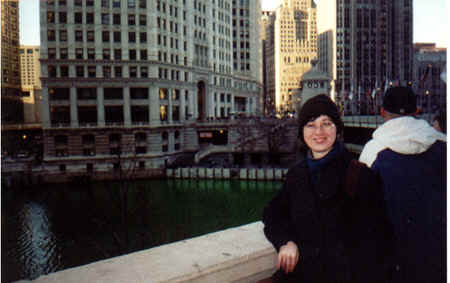
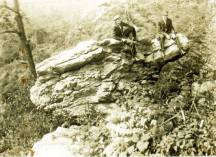
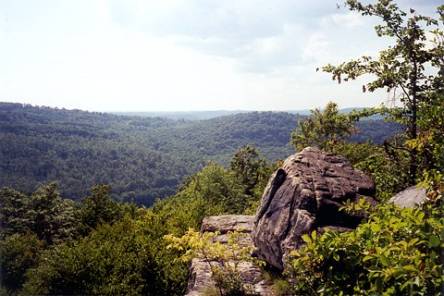
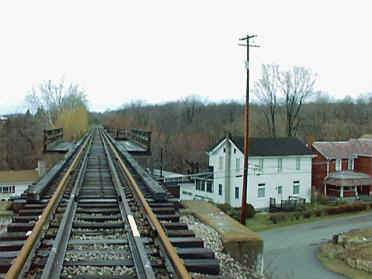
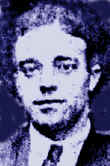
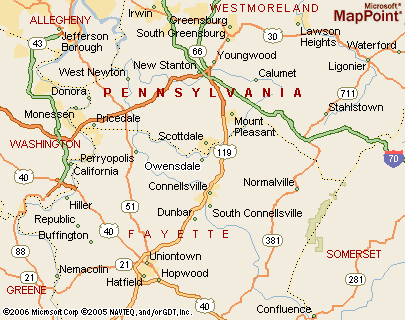 Owensdale
liegt inmitten von reichen Kohlevorkommen. Hier kreuzen sich die Eisenbahnlinien der
Owensdale
liegt inmitten von reichen Kohlevorkommen. Hier kreuzen sich die Eisenbahnlinien der 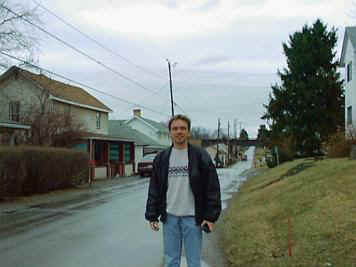
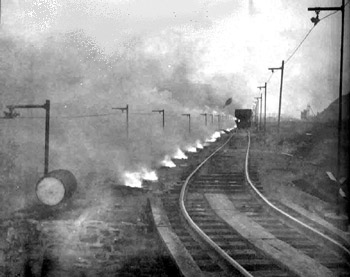 If I could get in a time machine and visit, that would be great. But these towns were built for the convenience of the coal mines, not for
the coal miners and their families. I wouldn’t want to live between a
If I could get in a time machine and visit, that would be great. But these towns were built for the convenience of the coal mines, not for
the coal miners and their families. I wouldn’t want to live between a 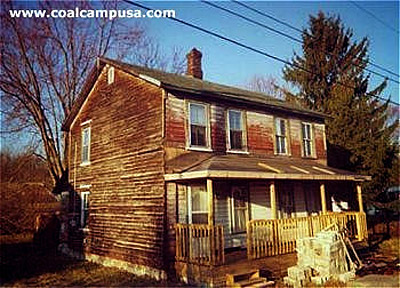 Die Bergwerksgesellschaft (Company) legte gewöhnlich zuerst
ungepflasterte Straßen durch ein Gebiet in der Nähe der Zeche und maß dann gleichmäßig
große Parzellen aus, sogenannte "patches" (Flecken, Flicken). Auf
jedes Patch wurde jetzt ein Zweifamilienhaus gebaut, das die Familien
erwerben konnten. Die Raten dafür wurden vom Lohn abgezogen. Nach ein paar Jahren
gehörte das Haus früher oder später ihnen. So entstanden um 1900 hunderte solcher
Patch towns (dtsch etwa: Zechenkolonien), die meisten
haben Bergwerksingenieure erbaut, und nicht Bauingenieure.
Die Bergwerksgesellschaft (Company) legte gewöhnlich zuerst
ungepflasterte Straßen durch ein Gebiet in der Nähe der Zeche und maß dann gleichmäßig
große Parzellen aus, sogenannte "patches" (Flecken, Flicken). Auf
jedes Patch wurde jetzt ein Zweifamilienhaus gebaut, das die Familien
erwerben konnten. Die Raten dafür wurden vom Lohn abgezogen. Nach ein paar Jahren
gehörte das Haus früher oder später ihnen. So entstanden um 1900 hunderte solcher
Patch towns (dtsch etwa: Zechenkolonien), die meisten
haben Bergwerksingenieure erbaut, und nicht Bauingenieure.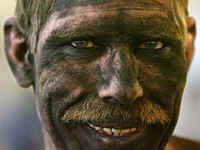
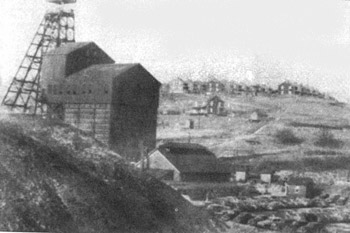
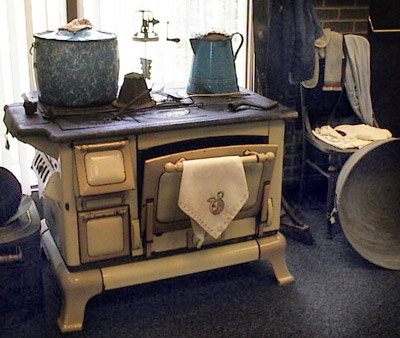
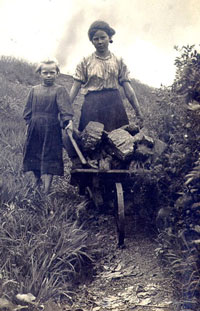
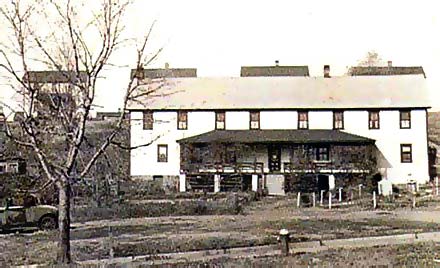 B
B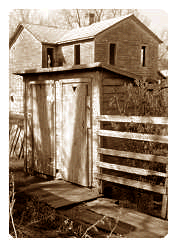 Outhouses
Outhouses

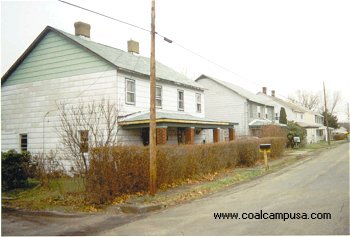 Company Houses
heute
Company Houses
heute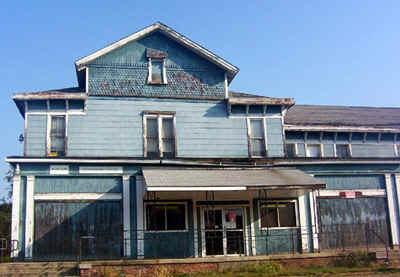
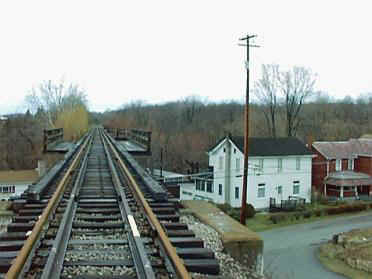 hlag, war weiß angestrichen oder
auch ein
Backsteinbau. Hier wurden auch an bestimmten Tagen
hlag, war weiß angestrichen oder
auch ein
Backsteinbau. Hier wurden auch an bestimmten Tagen 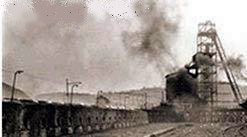 ill the mid 1900s, coal mining and
the making of coke for the Pittsburgh steel mills, was the largest industry
, next to farming, in Southwestern Pennsylvania. Coal mines large company
owned, and small private mines, abounded in this region. Many "patch
towns", sprang up around these mines. "Patch towns" were
a group of houses, built by the large coal companies, to house their workers.
ill the mid 1900s, coal mining and
the making of coke for the Pittsburgh steel mills, was the largest industry
, next to farming, in Southwestern Pennsylvania. Coal mines large company
owned, and small private mines, abounded in this region. Many "patch
towns", sprang up around these mines. "Patch towns" were
a group of houses, built by the large coal companies, to house their workers. 